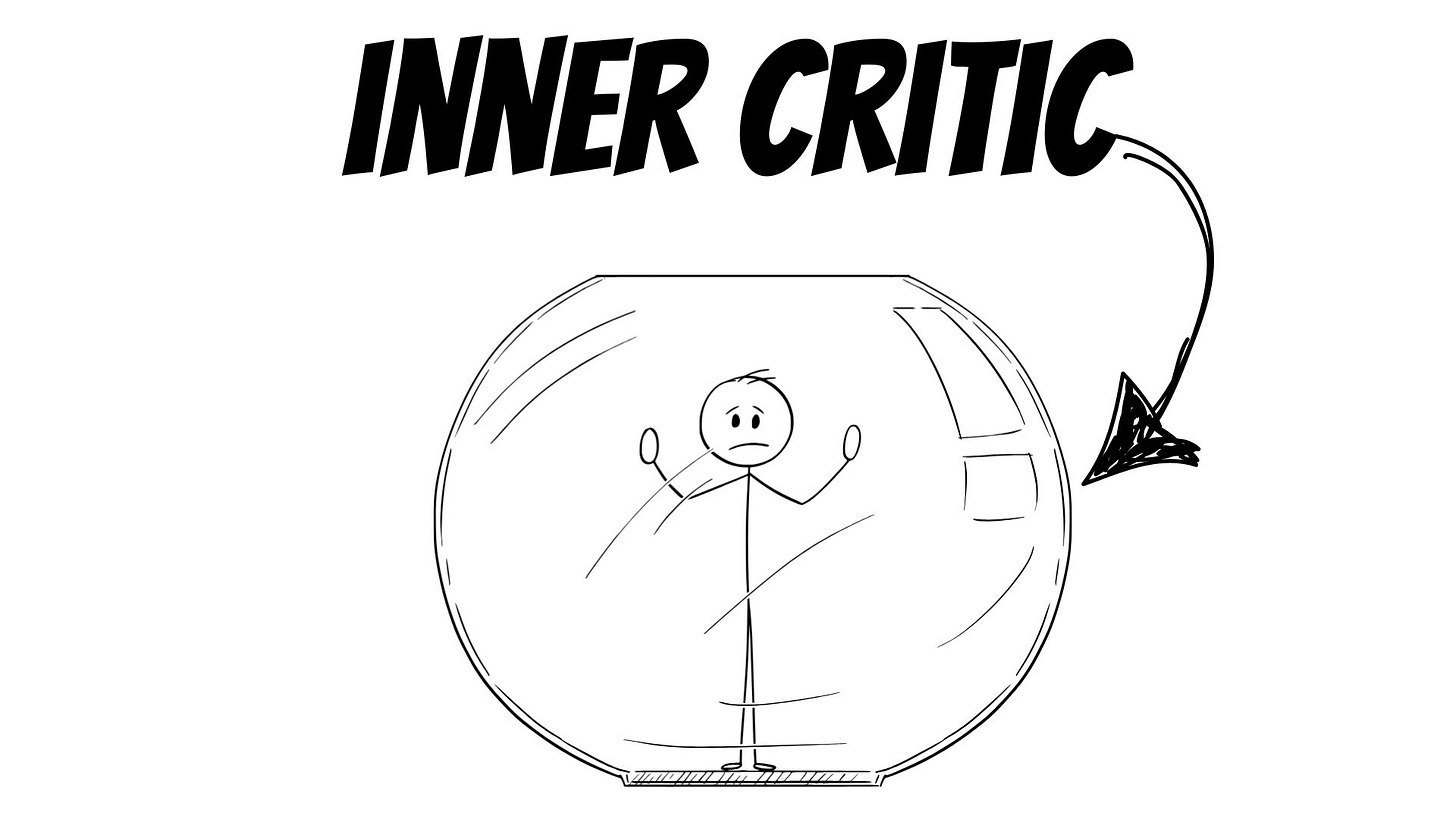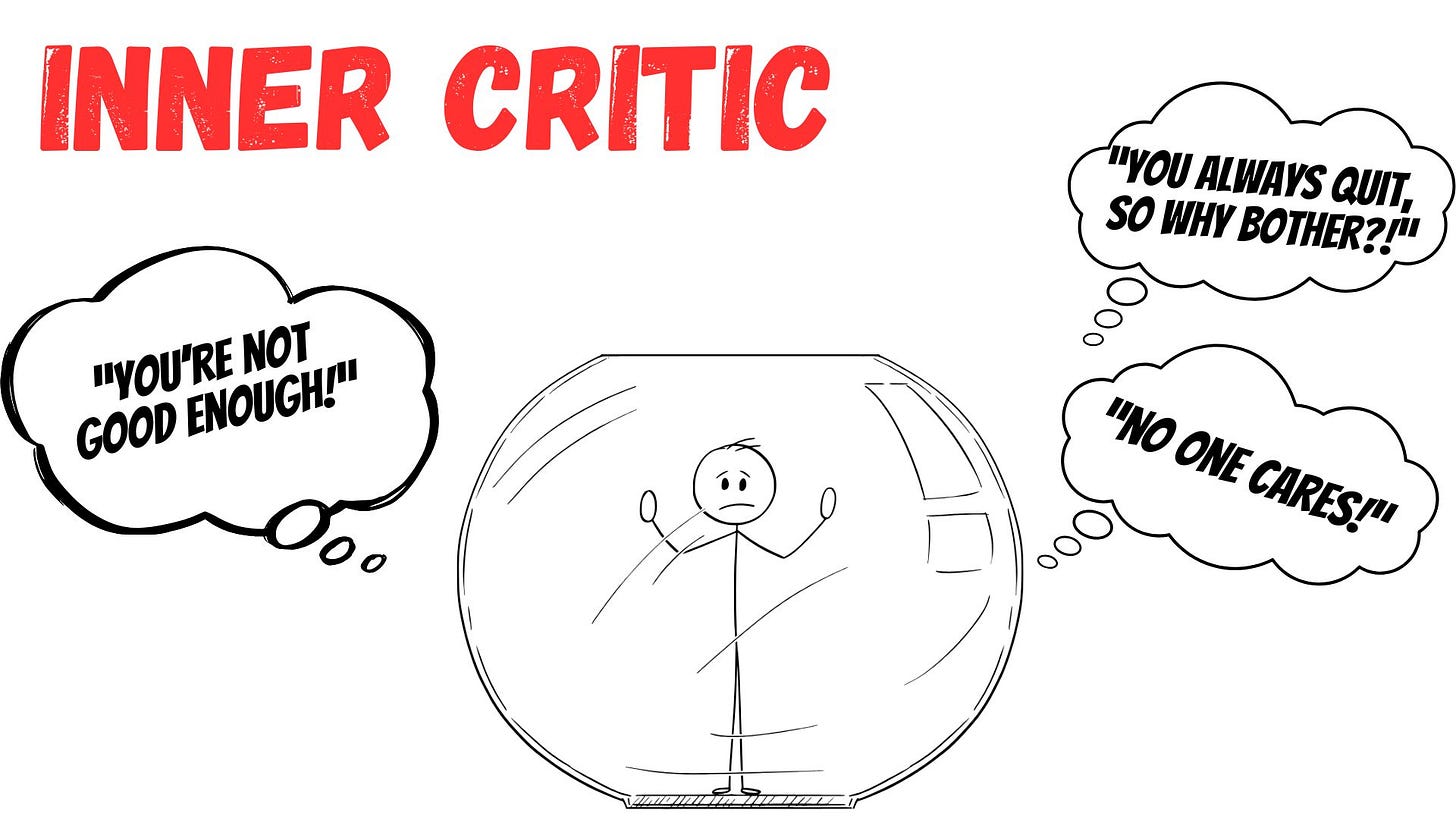How To Kill Your Inner Critic
Creative Sabotage
You can only be as creative as your inner critic allows.
Your creative ego doesn’t care about your potential.
It cares about controlling you.
👆 This is you.
The goldfish bowl is your comfort zone, patrolled by your inner critic.
It’s safe. Predictable
But your creative potential doesn’t want a goldfish bowl.
It wants to swim in the ocean.
The ocean is the unknown.
Your creative ego is addicted to predictability and certainty.
It hates the unknown.
So it gaslights your creativity.
It sends in your toxic inner critic: with all the bite and bile of a great white shark.
“You’re not good enough.”
“No one cares.”
“You always quit anyway, so why bother?”
The creative ego’s sole purpose is to keep you in your goldfish bowl.
Believe it, and the inner critic wins.
You are stuck in the goldfish bowl.
Swimming in futile circles, craving connection, slowly rusting away in existential angst with your song still inside you.
Van Gogh
Van Gogh wanted to swim in the ocean.
But his inner critic told him he was worthless. He believed it.
It drove him insane.
He sold one painting in his life.
He died believing he was a complete failure.
His final thoughts were that his life’s work was worthless.
Now the world knows him as one of the greatest artists who ever lived.
Perspective is everything.
👉 Brutal reminder: the inner critic always lies.
Harper Lee
Harper Lee is another goldfish bowl casualty.
She won a Pulitzer for To Kill a Mockingbird, one of the most celebrated novels ever.
Then silence.
She didn’t publish another book for fifty-five years!
The fear of not living up to her debut locked her back in the goldfish bowl.
Even the loudest voices can be silenced.
Perspective is everything.
Your inner critic is a liar.
Your creative ego is a goldfish bowl constructed out of your limiting beliefs and insecurities.
The Illusion
Your thoughts are not you.
You are the observer of your thoughts.
If you‘ve read Alan Watts. Eckhart Tolle or Michael Singer. You’ve heard this message countless times.
Your fears are false prophets of your creative ego.
They only have power if you believe in them.
Most people believe the inner critic is them.
Van Gogh did. Harper Lee did.
And tens of millions of creatives suffer the same fate.
Paralysed by their own potential.
But the fundamental principle of Taoism, Buddhism, and other spiritual practices cuts through the illusion.
The inner critic is not real.
It’s just your creative ego fucking with you.
You are not your thoughts; you are the observer of your thoughts.
And yes, it feels real.
Fear feels real in your body, but it’s just chemicals like cortisol and adrenaline reacting to the programmes you’re playing in your head.
That’s why it feels so real.
But it’s smoke and mirrors.
If you believe it, it becomes reality.
If you peel back the curtain, it dissolves.
Illusion Vs. Realty
There are great creative books: The Creative Act, The Artist’s Way, and The War of Art.
There are great spiritual books that dissolve the illusion of the ego: The Power of Now, The Untethered Soul, and The Wisdom of Insecurity.
True creativity is spirituality. Spirituality is true creativity.
Both demand presence. Both can only exist in flow.
“We are not human beings having a spiritual experience; we are spiritual beings having a human experience.”
— Pierre Teilhard de Chardin
Spirituality teaches that we are all one.
Creativity is the proof. It’s the act of connection, both to yourself and to others.
One shared consciousness with the illusion of separation from our egos in meat sacks
Creativity is the tool that connects us.
It’s how creative ideas spread.
We create our reality through our perspective of reality.
Believe the lies of the inner critic, and like Van Gogh, you stay in the goldfish bowl.
See the illusion, and you can swim freely in the ocean.
The goldfish bowl is not real; it’s a construct made of limiting beliefs created by your inner critic
Stop believing your inner critic, and you stop believing in the goldfish bowl.
Your Perspective Is Your Reality
Perspective is everything.
I feel compelled to write a book that shows alternative creative perspectives
It’s not to show that I’m right.
It‘s to show that your inner critic is wrong.
Ask yourself this: if your inner critic had no power over you, how would your creative world be different?



